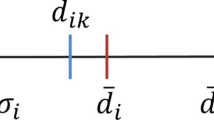Abstract
This paper proposes an online self-organizing identification algorithm for TSK fuzzy model. The structure of TSK fuzzy model is identified using distance. Parameters of the piecewise linear function consisting consequent part are obtained using recursive version of combined learning method of global and local learning. Both input and output spaces are considered in the proposed algorithm to identify the structure of the TSK fuzzy model. By processing clustering both in input and output space, outliers are excluded in clustering effectively. The proposed algorithm is non-sensitive to noise not by using data itself as cluster centers. The proposed algorithm can obtain a TSK fuzzy model through one pass. By using the proposed combined learning method, the estimated function can have high accuracy.
Preview
Unable to display preview. Download preview PDF.
Similar content being viewed by others
References
Leng, G., Prasad, G., McGinnity, T.M.: An on-line algorithm for creating self-organizing fuzzy neural networks. Neural Networks 17, 1477–1493 (2004)
Angelov, P.P., Filev, D.P.: An Approach to Online Identification of Takagi-Sugeno Fuzzy Models. IEEE Trans. System, Man, And Cybernetics-part B 34, 484–498 (2004)
Kasabov, N., Song, Q.: DENFIS: Dynamic Evolving Neural-Fuzzy Inference System and Its Application for Time-Series Prediction. IEEE Trans. Fuzzy Systems 10, 144–154 (2004)
Juang, C.-F., Lin, C.-T.: An On-line Self-Constructing Neural Fuzzy Inference Network and Its Applications. IEEE Trans. Fuzzy Systems 6, 12–32 (1998)
Lin, F.-J., Lin, C.-H., Shen, P.-H.: Self-Constructing Fuzzy Neural Network Speed Controller for Permanent-Magnet Synchronous Motor Drive. IEEE Trans. Fuzzy Systems 9, 751–759 (2001)
Yen, J., Wang, L., Gillespie, C.W.: Improving the Interpretability of TSK Fuzzy Models by Combining Global Learning and Local learning. IEEE Trans. Fuzzy Systems 6, 530–537 (1998)
Lin, C.-T.: A neural fuzzy control system with structure and parameter learning. Fuzzy Sets and Systems 70, 183–212 (1995)
Wu, S., Er, M.J., Gao, Y.: A Fast Approach for Automatic Generation of Fuzzy Fules by Generalized Dynamic Fuzzy Neural Networks. IEEE Trans. Fuzzy Systems 9, 578–594 (2001)
Er, M.J., Wu, S.: A fast learning algorithm for parsimonious fuzzy neural systems. Fuzzy Sets and Systems 126, 337–351 (2002)
Wu, S., Er, M.J.: Dynamic Fuzzy Neural Networks-A Novel Approach to Function Approximation. IEEE Trans. Systems, Man, and Cybernetics-Part B 30, 358–364 (2000)
Tzafestas, S.G., Zikidis, K.C.: NeuroFAST: On-line Neuro-Fuzzy ART-Based Structure and Parameter Learning TSK Model. IEEE Trans. Systems, Man, and Cybernetics-Part B 31, 797–802 (2001)
Kukolj, D., Levi, E.: Identification of Complex Systems Based on Neural and Takagi-Sugeno Fuzzy Model. IEEE Trans. Systems, Man, and Cybernetics-PART B 34, 272–282 (2004)
Azeem, M.F., Hanmandlu, M., Ahmad, N.: Structure Identification of Generalized Adaptive Neuro-Fuzzy Inference Systems. IEEE Trans. Fuzzy Systems 11, 666–681 (2003)
Liu, P.X., Meng, M.Q.-H.: Online Data-Driven Fuzzy Clustering With Applications to Real-Time Robotic Tracking. IEEE Trans. Fuzzy Systems 12, 516–523 (2004)
Kasabov, N.: Evolving Fuzzy Neural Networks for Supervised/Unsupervised Online Knowledge-Based Learning. IEEE Trans. Systems, Man, and Cybernetics-PART B 31, 902–918 (2001)
Angelov, P.P., Hanby, V.I., Buswell, R.A., Wright, J.A.: Automatic generation of fuzzy rule-based models from data by genetic algorithms. In: John, R., Birkenhead, R. (eds.) Advances in Soft Computing, Germany, pp. 31–40. Springer, Heidelberg (2001)
Angelov, P.P.: Evolving Rule-Based Models: A Tool for Design of Flexible Adaptive Systems. Springer, Heidelberg (2002)
Takagi, T., Sugeno, M.: Fuzzy identification of systems and its applications to modeling and control. IEEE Trans. Systems, Man, and Cybernetics 15, 116–132 (1985)
Wang, L.X.: A Course in Fuzzy Systems and Control. Prentice-Hall, Englewood Cliffs (1997)
Yamakawa, T., Matsumoto, G. (eds.): Methodologies for the Conception, Design, and Applications of Soft Computing, pp. 271–274. World Scientific, Singapore (1998)
Kim, K., Kim, Y.-K., Kim, E., Park, M.: A New Fuzzy Modeling Approach. Proc. of FUZZ-IEEE 2004, 773–776 (2004)
Kim, E., Park, M., Ji, S., Park, M.: A new approach to fuzzy modeling. IEEE Trans. Fuzzy Systems 5, 328–337 (1997)
Kim, K., Kyung, K.M., Park, C.-W., Kim, E., Park, M.: Robust TSK Fuzzy Modeling Approach Using Noise Clustering Concept for Function Approximation. In: Zhang, J., He, J.-H., Fu, Y. (eds.) CIS 2004. LNCS, vol. 3314, pp. 538–543. Springer, Heidelberg (2004)
Isermann, R., Lachmann, K.-H., Matko, D.: Adaptive Control Systems. Prentice-Hall, Englewood Cliffs (1992)
Ljung, L.: System Identification: Theory for the user. Prentice-Hall, Englewood Cliffs (1998)
Goodwin, G.C., Sin, K.S.: Adaptive Filtering Prediction and Control. Prentice-Hall, Englewood Cliffs (1984)
Haykin, S.: Adaptive Filter Theory. Prentice-Hall, Englewood Cliffs (1996)
Wai, R.-J., Chen, P.-C.: Intelligent Tracking Control for Robot Manipulator Including Actuator Dynamics via TSK-Type Fuzzy Neural Network. IEEE Trans. Fuzzy Systems 12, 552–559 (2004)
Kiguchi, K., Tanaka, T., Fukuda, T.: Neuro-Fuzzy Control of a Robotic Exoskeleton With EMG Signals. IEEE Trans. Fuzzy Systems 12, 481–490 (2004)
Wang, L., Frayman, Y.: A dynamically generated fuzzy neural network and its application to torsional vibration control of tandem cold rolling mill spindles. Engineering Appl. Artificial Intelligence 15, 541–550 (2002)
Author information
Authors and Affiliations
Editor information
Editors and Affiliations
Rights and permissions
Copyright information
© 2005 Springer-Verlag Berlin Heidelberg
About this paper
Cite this paper
Kim, K., Whang, E.J., Park, CW., Kim, E., Park, M. (2005). A TSK Fuzzy Inference Algorithm for Online Identification. In: Wang, L., Jin, Y. (eds) Fuzzy Systems and Knowledge Discovery. FSKD 2005. Lecture Notes in Computer Science(), vol 3613. Springer, Berlin, Heidelberg. https://doi.org/10.1007/11539506_23
Download citation
DOI: https://doi.org/10.1007/11539506_23
Publisher Name: Springer, Berlin, Heidelberg
Print ISBN: 978-3-540-28312-6
Online ISBN: 978-3-540-31830-9
eBook Packages: Computer ScienceComputer Science (R0)




